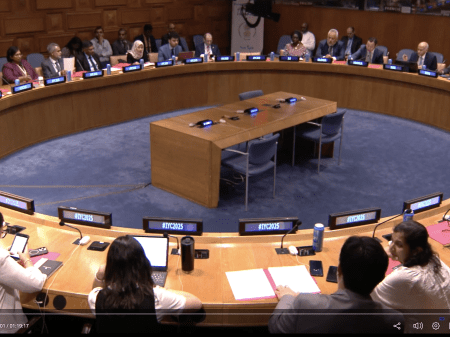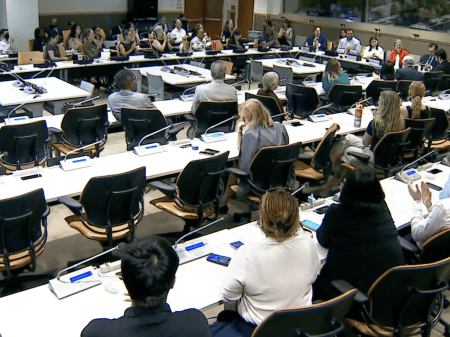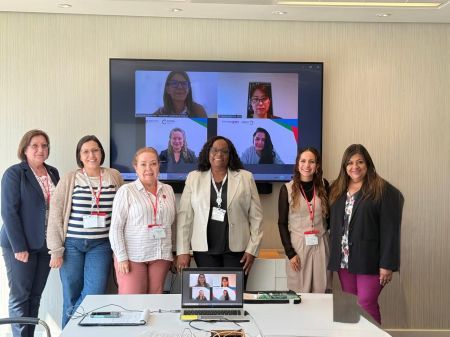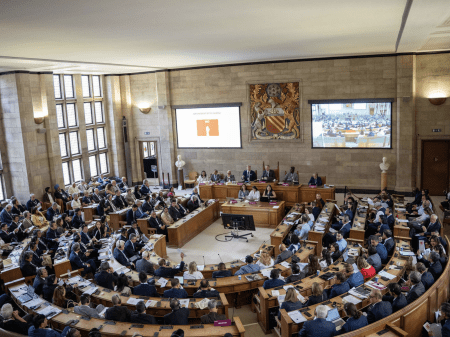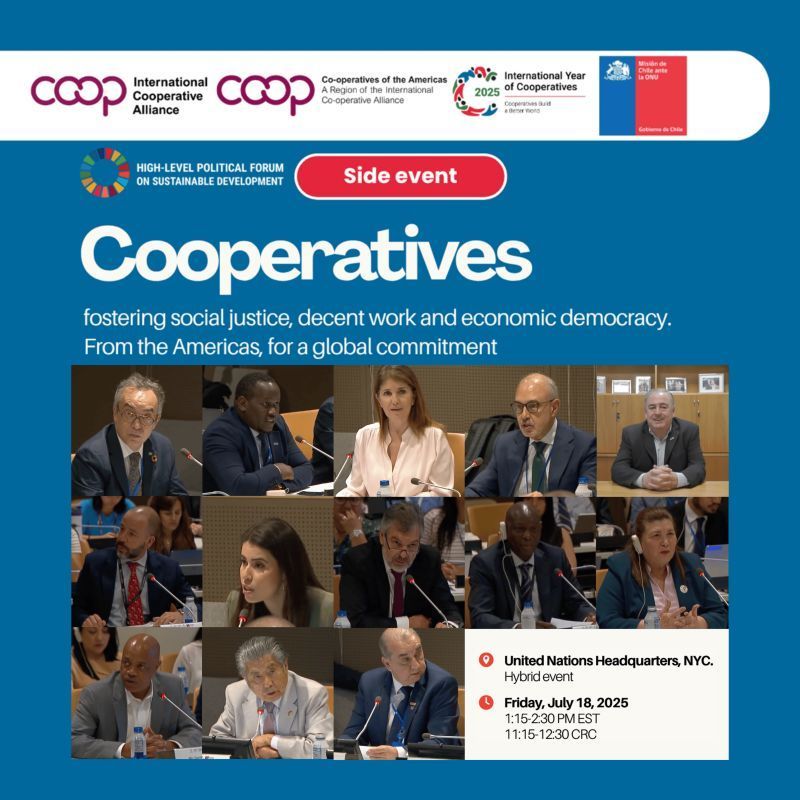
The Permanent Mission of Chile to the United Nations and the International Cooperative Alliance (ICA) Americas Regional Office (ACI Americas) hosted a joint conference at the UN headquarters in New York to showcase cooperatives’ contribution in the Americas.
Themed “Cooperatives fostering Social Justice, Decent Work and Economic Democracy: from the Americas, for a global engagement”, the event formed part of the UN High-level Forum on Sustainable Development and was an opportunity to foster collaboration between UN system, cooperatives, governments and international organisations.
In his opening remarks, Danilo Salerno, Regional Director of ACI Americas, highlighted the event as a historic milestone, as the first time Cooperatives of the Americas directly organised an activity of this kind at UN Headquarters. Held under the official banner of the International Year of Cooperatives 2025, it convened government leaders, UN representatives, and prominent regional cooperative voices to showcase the movement’s global relevance.
Setting the scene for discussions, Joseph Njuguna, Director of Policy at the ICA, explained that the high level political forum is taking place at a critical moment, with the world approaching the final stretch of the 2030 Agenda for Sustainable Development.
“As we prepare for the Second World Social Summit in Doha this November, today's discussion is a stepping stone to define how cooperatives can shape the future of global social development frameworks.
“Let today's conversation fuel new collaboration between cooperatives, UN agencies, governments and international organisations, and we invite all of you to engage with cooperatives, listen to them, to their innovations, and partner with them to build economies of solidarity and sustainability,” he added.
Next, the event heard from Ambassador Paula Narváez Ojeda, Representative, Permanent Mission of Chile to the UN; and Co-chair, Regional Committee of the Allied Parties for the International Year of Cooperatives in the Americas.
Ms Narváez Ojeda described Chile’s efforts to grow the cooperative movement, including by creating a National Institute of Associations and Cooperativism (INAC), which connects public institutions and the private sector to promote cooperatives.
These measures have helped grow the cooperative movement in Chile by 10%, with almost 2,000 new cooperatives established between August 2023 and August 2024.
“Let us continue working together, from the Americas to the world, so that cooperativism will be recognised as a transformative force and an indispensable actor in the building of sustainable development with social justice,” she said.
Ambassador Norberto Moretti, Deputy Representative, Permanent Mission of Brazil to the UN, also took the floor to describe the role of cooperatives as strategic players for building inclusive economic models in Brazil. For example, cooperatives are included in policies designed to drive social and economic transformation, such as the National Programme to Strengthen Family Farming (Pronaf).
“Cooperatives are at the core of these efforts to diminish impoverishment in rural areas,” he said.
Through the Brazilian Cooperation Agency, the country’s cooperatives have also been supporting technical cooperation projects in the Global South.
ICA President, Dr Ariel Guarco, addressed the meeting via a video message in which he talked about the increased recognition of the cooperative model as well as their contributions to the SDGs.
“It is truly encouraging to see how in the Americas, we are promoting this message and deepening the cooperative agenda in close collaboration with government and international institutions, all in the pursuit of a continent and world with social justice, decent work and economic democracy, among other goals. In this spirit, I urge you to continue to work together, harnessing the momentum of this International Year of Cooperatives,” he added.
The event continued with a session exploring the contributions of cooperatives to decent work and the care economy (SDG#3, SDG#5 y SDG#8), moderated by Andrés Alejandro Borlone Díaz, First Secretary, Permanent Mission of Chile to the UN.
“We know the cooperatives are not only economic agents, they are agents of transformation,” said Fabíola Silva Nader Motta, General manager, Sistema OCB (Brazil).
With the UN’s COP30 Climate Summit, due to be held in Belém, Brazil, in November, OCB is working to position the cooperative model as an essential agent for the achievement of global climate goals.
“We invite the international community to be our strategic partners in climate action. We don't want to be privileged, but for cooperatives to be included in policies nationally and internationally - and guarantee co-op voices are heard,” said Ms Silva Nader Motta.
Next, Dr Dardo González, President of Sanatorio Americano cooperative (Uruguay), talked about the role of healthcare cooperatives in his country. With 35 clinics and 1,900 workers, Sanatorio Americano has set the benchmark for highly complex medical procedures, providing 36% of cardiology procedures in Uruguay.
“We believe we are contributing to the SDGs by guaranteeing a healthy life and promoting well being for everyone.”
Another session moderated by Andrew Allimadi, Coordinator of cooperative affairs, UNDESA; and Coordinador at COPAC, Committee for the Promotion and Advancement of Cooperatives, explored cooperatives’ contributions to Human Development and Social Justice (SDG#5 y SDG#17).
Referring to the UN’s World Social report, Mr Allimadi explained it revealed some worrying trends, including growing inequality, fragmentation within societies, disillusionment among young people and lack of trust in institutions, including the UN.
“So we are in a very difficult situation, and in these circumstances, I'm sure we all agree, cooperatives become even much, much more important,” he said.
Dr Ana Beatriz Riquelme Estigarribia, President of the Cooperative Confederation of Paraguay – CONPACOOP (Paraguay), highlighted the importance of including cooperatives in education curricula.
"Paraguay is truly redoubling its efforts and investing in education. We believe that every country needs a long-term commitment to education. In this context, across the Americas, it’s important that we share our initiatives in this field. By doing so, we can learn from one another and adopt best practices within the cooperative sector," she said.
Cornelius Blending, the President of the Federation of Southern Cooperatives, which is a member of the NCBA CLUSA (US), explained how his organisation was born out of Black farmers’ necessity to sell at fair prices.
“Jointly, we own and control 1,300 acres of land,” he said.
“We look forward to working with this delegation, with many in this room, with various countries, and figuring out how we share and especially in today's time when we have seen resources being cut by our government, by various governments, but the cooperative model has never been based on any government, and I think it's about the cooperation among cooperatives (p6) and how we engage with each other.”
In a third and final session on Economic Democracy (SDG#17), Mr Pedro Morales, General Manager of Riobamba Cooperative Credit Union (Ecuador), described the challenges faced by cooperatives in his country where a recent government decree makes it compulsory for some savings and credit cooperatives to convert to banks.
Credit and saving cooperatives account for 30% of financial services assets and savings in Ecuador, being one of the key players in the sector.
“We'd like to ask all of our friends, all these leaders of ICA and the UN, which promotes this social economy, to write letters to our national government, asking them to withdraw the decree so that we can continue with our cooperative and continue to strengthen our system,” he said.
Bringing the discussions to a close, Dr José Alves de Souza Neto, the President of ACI Americas expressed his wishes for the event to set the tone for further engagements.
“It needs to be one event in our path for continuity. We want to create a permanent dialogue between the UN system and cooperatives in the Americas. We want to be in international forums with our own voice, our data, our experiences and our solutions. We want global governance mechanisms to look more closely at what we are, what we do, and what we can build together. I'm humbled when I say that the 2030 Agenda needs cooperatives, and after 2030 the world will need us even more before I thank all of you,” he concluded.
The recording of the event is available here: https://webtv.un.org/en/asset/k10/k10xe7m2q8

